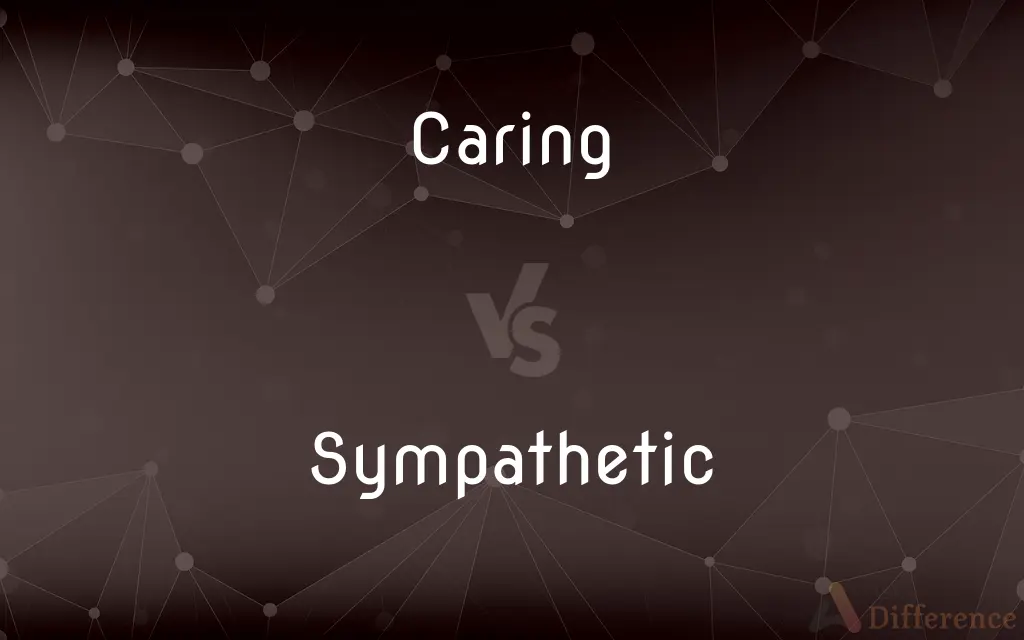Caring vs. Sympathetic — What's the Difference?
By Tayyaba Rehman — Published on October 12, 2023
"Caring" indicates displaying kindness and concern for others. "Sympathetic" means showing understanding or compassion toward others' feelings or situations.

Difference Between Caring and Sympathetic
Table of Contents
ADVERTISEMENT
Key Differences
"Caring" is a term that embodies the act of showing kindness, attention, and concern for others, often reflecting a desire to help or look after them. It implies a deep-seated sentiment of wanting to assist or be there for someone. "Sympathetic", on the other hand, revolves around the ability to understand and share the feelings of another. It's an emotional connection to someone else's experiences, whether joyful or painful.
A "caring" individual might be someone who actively looks for ways to help or assist, perhaps volunteering their time or offering aid when they see someone in need. Their behavior is driven by a genuine concern for the well-being of others. A "sympathetic" individual, conversely, might not always actively intervene but would feel and express genuine concern or understanding about another's situation.
For instance, in a scenario where someone loses their job, a "caring" person might offer to help them find a new one or support them financially, emphasizing the act of assistance. In contrast, a "sympathetic" individual would understand the emotional pain and stress associated with the loss, offering words of comfort or a listening ear.
In essence, while both "caring" and "sympathetic" are grounded in concern for others, "caring" often manifests through actions of kindness and support, while "sympathetic" centers around emotional understanding and connection.
Comparison Chart
Primary Meaning
Showing kindness and concern for others
Understanding and sharing others' feelings
ADVERTISEMENT
Nature
Active assistance
Emotional understanding
Expression
Through actions of support
Through feelings and words
Example Scenario
Providing help when someone is in need
Offering condolences when someone is grieving
Associated with
Acts of kindness
Emotional resonance
Compare with Definitions
Caring
Providing attention and assistance to those in need.
His caring approach made him an excellent nurse.
Sympathetic
Being affected by others' emotions easily.
As a sympathetic person, he often cried during emotional movies.
Caring
Showing concern for others' well-being.
Her caring nature made her volunteer at the orphanage every weekend.
Sympathetic
Conveying pity or concern for someone.
The community was sympathetic when they heard about the tragedy.
Caring
Taking the time to do something right or well for someone else.
Her caring touch was evident in the meals she prepared.
Sympathetic
Aligning with someone in feeling or perspective.
She was sympathetic to the cause, having experienced it herself.
Caring
Being inclined to help and protect.
She had a caring attitude towards all animals.
Sympathetic
Of, expressing, feeling, or resulting from sympathy
A sympathetic glance.
Caring
Displaying kindness and concern for others
A caring and invaluable friend
Sympathetic
Favorably inclined
Not at all sympathetic to her proposal.
Caring
The work or practice of looking after those unable to care for themselves, especially on account of age or illness
The caring professions
Sympathetic
Agreeably suited to one's disposition or mood; congenial
Sympathetic surroundings.
Caring
Feeling and exhibiting concern and empathy for others.
Sympathetic
Easy to identify with and care about; likeable
A gloomy novel without a single sympathetic character.
Caring
(of a person) Kind, sensitive, or empathetic.
She's a very caring person; she always has a kind word for everyone.
Sympathetic
Of, relating to, or acting on the sympathetic nervous system
A sympathetic neuron.
Sympathetic stimulation.
Caring
Present participle of care
Sympathetic
Relating to or being vibrations, especially musical tones, produced in one body by energy from a nearby vibrating body and having the same frequency as the vibration of the nearby body.
Caring
The act of one who cares.
Sympathetic
Emitting such vibrations
Sympathetic strings.
Caring
A loving feeling
Sympathetic
Of, related to, feeling, showing, or characterized by sympathy.
John looked very upset. I gave him a sympathetic look.
Caring
Showing a care;
A caring mother
Sympathetic
Showing approval of or favor towards an idea or action.
Caring
Having or displaying warmth or affection;
Affectionate children
Caring parents
A fond embrace
Fond of his nephew
A tender glance
A warm embrace
Sympathetic
Attracting the liking of others.
Caring
Feeling and exhibiting concern and empathy for others;
Caring friends
Sympathetic
(construction) Designed in a sensitive or appropriate way.
Caring
Expressing affection and warmth towards someone.
The child felt secure due to the caring environment at home.
Sympathetic
(relational) Relating to, producing, or denoting an effect which arises through an affinity, interdependence, or mutual association.
Sympathetic magic is based on imitation or correspondence.
Sympathetic ink
Sympathetic
A supernatural connection or power resulting from two items having the same form or some other correspondence.
Sympathetic
(sound) Relating to musical tones produced by sympathetic vibration or to strings so tuned as to sound by sympathetic vibration.
Sympathetic
Relating to or denoting the part of the autonomic nervous system consisting of nerves arising from ganglia near the middle part of the spinal cord, supplying the internal organs, blood vessels, and glands, and balancing the action of the parasympathetic nerves.
Sympathetic innervation involves epinephrine.
Sympathetic
Inclined to sympathy; sympathizing.
Far wiser he, whose sympathetic mindExults in all the good of all mankind.
Sympathetic
Produced by, or expressive of, sympathy.
Ope the sacred source of sympathetic tears.
Sympathetic
Produced by sympathy; - applied particularly to symptoms or affections. See Sympathy.
Sympathetic
Of or relating to the sympathetic nervous system;
Sympathetic neurons
Sympathetic stimulation
Sympathetic
Expressing or feeling or resulting from sympathy or compassion or friendly fellow feelings; disposed toward;
Sympathetic to the students' cause
A sympathetic observer
A sympathetic gesture
Sympathetic
Having similar disposition and tastes;
A compatible married couple
With their many similar tastes, he found her a most sympathetic companion
Sympathetic
Showing or motivated by sympathy and understanding and generosity;
Was charitable in his opinions of others
Kindly criticism
A kindly act
Sympathetic words
A large-hearted mentor
Sympathetic
(of characters in literature or drama) evoking empathic or sympathetic feelings;
The sympathetic characters in the play
Sympathetic
Relating to vibrations that occur as a result of vibrations in a nearby body;
Sympathetic vibration
Sympathetic
Displaying compassion towards others.
He was always sympathetic to those facing hardships.
Sympathetic
Understanding and relating to someone's feelings.
She gave a sympathetic ear to her friend's worries.
Common Curiosities
Is being sympathetic the same as feeling pity?
Not necessarily; sympathy involves understanding and sharing feelings, while pity often implies feeling sorry for someone.
Does being sympathetic mean you agree with someone?
No, one can understand and share feelings without necessarily agreeing with the cause or perspective.
Can an organization be described as "caring"?
Yes, if its actions and policies show concern for the well-being of individuals or communities.
Can acts of kindness always be labeled as "caring"?
Often yes, as caring usually manifests in acts of kindness and concern.
Can someone be caring without being sympathetic?
Yes, a person can provide assistance without necessarily understanding or feeling another's emotions.
Is sympathy a form of emotional intelligence?
Yes, being sympathetic often requires understanding and resonating with others' emotions.
Share Your Discovery

Previous Comparison
CD vs. Vinyl Record
Next Comparison
Should vs. Should BeAuthor Spotlight
Written by
Tayyaba RehmanTayyaba Rehman is a distinguished writer, currently serving as a primary contributor to askdifference.com. As a researcher in semantics and etymology, Tayyaba's passion for the complexity of languages and their distinctions has found a perfect home on the platform. Tayyaba delves into the intricacies of language, distinguishing between commonly confused words and phrases, thereby providing clarity for readers worldwide.
















































